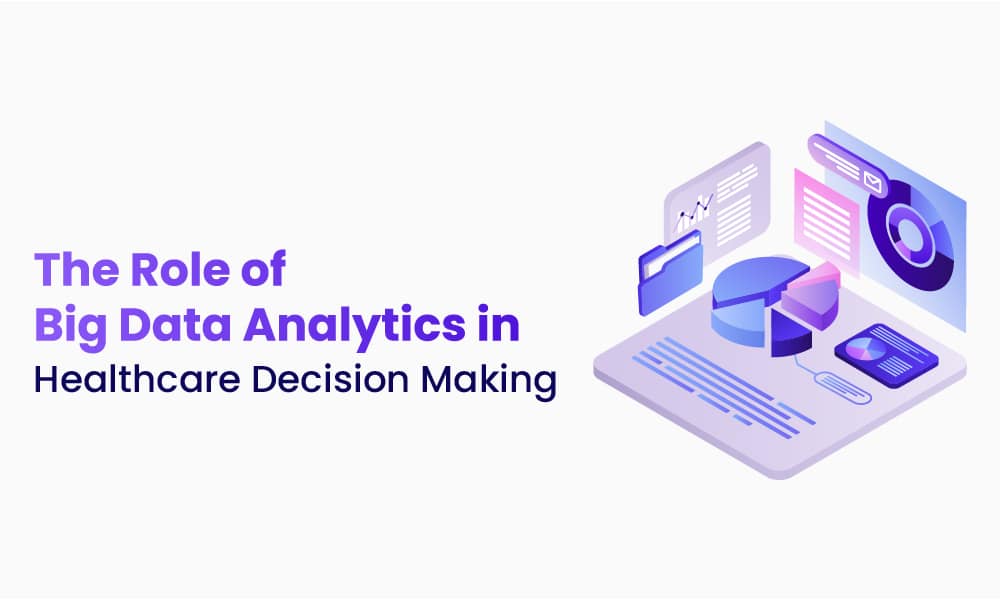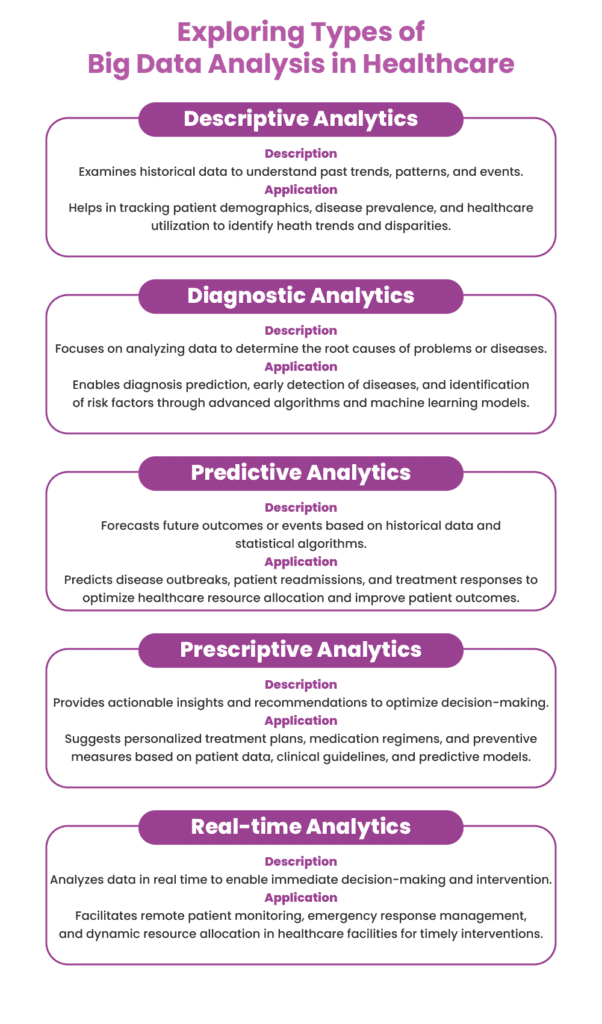
The healthcare landscape is currently undergoing a seismic digital transformation, with big data analytics in healthcare, data playing a central role in reshaping how medical and healthcare providers respond to market needs and deliver care. The healthcare sector is generating an astounding amount of data – 2314 exabytes per year, which is 15 times more than a decade ago. This highlights the data-rich environment that healthcare operates in. When harnessed effectively, this wealth of structured and unstructured data offers limitless potential for modernizing healthcare technology and improving patient care delivery.
This is where Big Data Analytics (BDA) stands out as a transformative force. BDA in healthcare empowers providers to harness cutting-edge technologies, enabling advancements in both patient treatment and health management. The potential of BDA to revolutionize healthcare decision-making, reshape patient care, optimize operational efficiency, and shape public health strategies cannot be overstated.
While the healthcare sector is inherently data-rich, the widespread adoption of big data analytics in healthcare has faced hurdles, including concerns about data privacy and the inherent complexity of healthcare data. Nevertheless, an increasing number of healthcare institutions are recognizing the pivotal role of data-driven decision-making. This recognition has spurred investments in healthcare analytics solutions, marking a significant step toward a data-driven healthcare future.
Types of Big Data Analytics in Healthcare

Descriptive Analytics
Descriptive analytics involves the examination of historical healthcare data to understand past events. It provides a retrospective view of patient and operational data, helping healthcare organizations track trends and patterns. This kind of analytics forms the basis for more advanced types like predictive and prescriptive analytics. It helps to understand the historical data in healthcare by providing a context.
Use Cases:
Patient Profiling: Understanding patient demographics for resource allocation and healthcare planning.
Bed and Resource Management: Efficient bed management, resource allocation, and inventory control.
Financial Analysis: Budget planning and cost containment through financial data analysis.
Quality Metrics: Tracking quality metrics like readmission rates and patient satisfaction scores.
Operational Efficiency: Optimizing various hospital operations, including patient flow and appointment scheduling.
Epidemiological Surveillance: Monitoring disease prevalence and supporting public health interventions.
Predictive Analytics
Predictive analytics leverages historical healthcare data to make informed predictions about future events or outcomes. It plays a crucial role in improving patient care, resource management, and overall healthcare operations, enabling proactive approaches to healthcare.
Use Cases:
Disease Outbreak Prediction: Forecasting epidemics using data from multiple sources.
Readmission Risk: Identifying patients at risk of readmission for tailored care.
Patient Stratification: Allocating resources based on patient risk profiles.
Chronic Disease Management: Predicting disease progression for timely interventions.
Fraud Detection: Identifying healthcare fraud and abuse by spotting irregularities.
Medication Adherence: Predicting patient adherence for intervention.
Supply Chain Management: Ensuring efficient inventory and supply management.
Personalized Treatment: Designing treatment plans according to the specific needs of individual patients.
Radiology Assistance: Aiding radiologists by flagging areas of concern in medical images.
Clinical Decision Support: Assisting clinicians in real-time decision-making.
Prescriptive Analytics
Prescriptive analytics goes beyond predicting future events and suggests actions to optimize outcomes. It provides recommendations for decision-makers, helping healthcare providers choose the best treatment options and interventions, ultimately enhancing the quality of care, reducing costs, and achieving better healthcare outcomes.
Use Cases:
Treatment Recommendations: Prescribing personalized treatments for patients based on their data and clinical guidelines.
Medication Management: Customizing medication plans with the right drugs, doses, and schedules.
Operational Efficiency: Streamlining healthcare operations, reducing wait times, and enhancing patient flow.
Epidemiological Response: Guiding responses to disease outbreaks and containment efforts.
Policy Formulation: Shaping healthcare policies and guidelines with data-driven insights.
Emergency Response: Guiding emergency responders in resource allocation and patient prioritization during crises.
Diagnostic Analytics
Diagnostic analytics aims to identify the root causes of particular healthcare issues. This empowers healthcare professionals to make decisions based on data, improving patient care, operational efficiency, and overall healthcare services.
Text Analytics
Text analytics processes unstructured data from sources like electronic health records, clinical notes, and patient feedback, offering insights through sentiment analysis and key information identification.
Genomic Analytics
Genomic analytics focuses on the analysis of genetic data, advancing the understanding of genetic variations and their implications for healthcare, leading to more precise and effective interventions.
Key Areas of Impact
1. Personalized Care: The Key to Optimized Treatment
Big data analytics in healthcare has given rise to personalized patient care, offering an unprecedented level of tailored treatment. By analyzing a patient’s comprehensive medical history, including genetic information, lifestyle factors, and treatment responses, healthcare providers can make highly informed decisions about diagnosis and treatment. This specialized approach is especially valuable in complex cases like cancer, where precision medicine can change the game completely.
2. Streamlining Operations
Hospitals and healthcare facilities are more than just places of care; they are intricate organizations. Thanks to big data analytics in healthcare, healthcare administrators can now optimize resource allocation, reduce patient wait times, and enhance overall operational efficiency. This ultimately leads to significant cost savings and improved patient experiences.
Ezovion Healthcare Analytics, supported by its intelligent platform, empowers healthcare providers with comprehensive insights into administrative, financial, clinical, and operational aspects. This versatile software is designed to cater to the needs of all healthcare providers, offering a holistic perspective on performance across various domains, including clinics, pharmacies, laboratories, radiology, inventory management, and outpatient departments (OPD).
Furthermore, its robust integrations facilitate a deep understanding of the interconnected data within the healthcare landscape, enabling providers to make informed decisions swiftly. This powerful combination of features equips healthcare professionals with the tools they need for effective decision-making and streamlined operations.
3. Curbing Medical Errors
Combating medical errors is a paramount concern in the healthcare industry. Fortunately, big data analytics in healthcare has the power to identify patterns that contribute to medical mistakes, such as medication mix-ups or misdiagnoses. By analyzing these patterns, healthcare providers can implement preventive measures and reduce adverse events, enhancing patient safety and safeguarding the reputation of healthcare institutions.
4. Public Health: Data-Driven Strategies
Big data analytics in healthcare brings unprecedented advantages to public health on a large scale.By analyzing health data on a massive level, healthcare systems can identify trends, disease outbreaks, and at-risk populations, allowing for proactive public health measures and optimized resource planning.
5. Streamlining Drug Discovery
Big data analytics has been pivotal in drug discovery, accelerating drug development, clinical trial recruitment, and post-market surveillance. The market for big data analytics in the pharmaceutical industry was projected to exceed $17 billion by 2025.By analyzing vast datasets, researchers can identify potential drug candidates, recruit suitable patients for trials, and closely monitor drug safety and efficacy, benefiting patients worldwide.
6. Remote Revolution: The Rise of Telemedicine
Thanks to big data analytics in healthcare, the rise of telemedicine and remote patient monitoring has gained unprecedented momentum. Real-time tracking of patient vitals, delivered remotely, has become a reality through data analytics. Continuous monitoring of patients’ health is now possible for physicians. Any anomalies detected can prompt immediate interventions, even from a distance.
7. Informed Healthcare Policies
Policymakers are harnessing the power of big data analytics to shape public health strategies, allocate resources, and improve healthcare regulations and legislation. By analyzing population health data, policymakers can make evidence-based decisions that ensure healthcare policies are responsive to the needs of the community.
The future of Big Data Analytics in Healthcare
The rapid growth of the global healthcare analytics market, with an anticipated Compound Annual Growth Rate (CAGR) of approximately 25% between 2021 and 2026, underscores the industry’s increasing recognition of the immense potential held by data analytics. While healthcare analytics is still considered to be in its nascent stages, its transformative power is becoming increasingly evident.
As healthcare analytics tools continue to evolve, we can expect even more comprehensive and sophisticated use of data in the field. The integration of big data analytics becomes an essential feature of a data-driven and patient-centric future in healthcare. The possibilities are boundless, but the benefits are far-reaching, ultimately leading to better healthcare.







